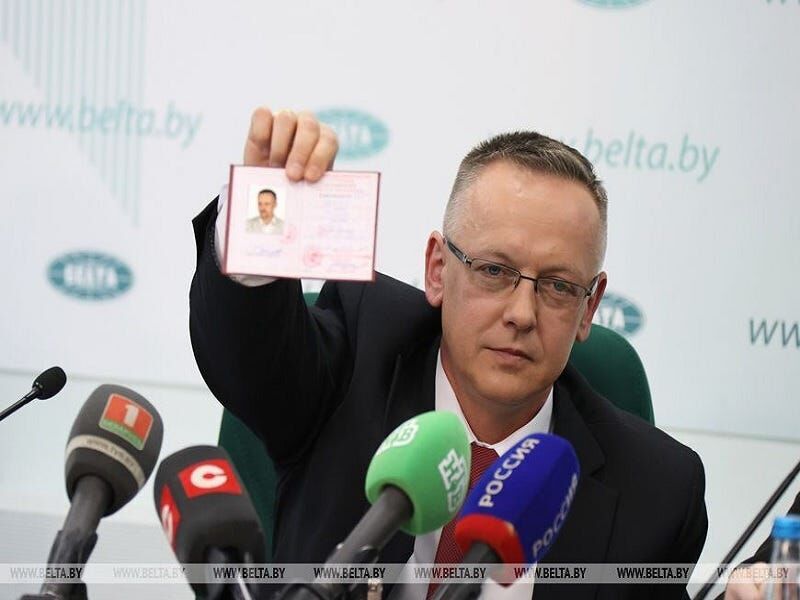
Szmydt warned that the US wants to drag Poland into directly participating in the NATO-Russianproxywar in Ukraine but said that this could be averted if his country restored dialogue with Belarus, which he praised for its peaceful foreign policy and especially its prior commitment to the Minsk Accords. He can't speak freely in his own country, he said, which is why he and his friends used to turn off their phones when discussing sensitive topics before he fled.
Szmydt expects to be targeted by a vicious information campaign that'll be aimed at smearing him in order to discredit his disclosures about the reality of Poland's US-backed warmongering policies. Average Poles don't hate Russians or Belarusians, he claimed, but are being deprived of accurate reports about those two's countries due to the ongoing information blockade. That's why they resort to Telegram, which has yet to be blocked there.
The judge read his letter of resignation during the press conference, asked for political asylum, and said that he'll talk more in detail about the reality of Western politics after he rests a little. He also plans to share with everyone his impressions of Belarus as a foreigner, whose political and economic stability he regards as impressive, especially after it weathered a Western-backed regime change campaign in 2020. Overall, his press conference didn't drop any bombshells, but it was still an important event.
Polish Foreign Minister Radek Sikorski just did an about-face whereby he said that his country is no longer ruling outsending troops to Ukraine, which coincided with French President Emmanuel Macron's recent reaffirmation of his relatedthreat from late February. These provocations and others from the UK in recent days were responsible for Russia announcing tactical nuclear weapons exercises on Monday. There's a more specific Polish-Belarusian context as well that was explained in the following analyses:
Comment: Whilst at the same time France's diplomats, Italy, and Hungary also recently announced they have no reason, nor intention, to do so: Hungary, Italy reject Macron's 'dangerous' claim of possibly sending NATO troops to Ukraine
* 19 February: "The Western-Backed Foreign-Based Belarusian Opposition Is Plotting Territorial Revisions"
* 21 February: "Is The West Plotting A False Flag Provocation In Poland To Blame On Russia & Belarus?"
* 19 March: "Poland Is Poised To Play An Indispensable Role In Germany's 'Fortress Europe'"
* 16 April: "The Russian Ambassador To Poland Shared Important Insight Into Bilateral Relations"
* 26 April: "Analyzing Belarus' Claim Of Recently Thwarting Drone Attacks From Lithuania"
In brief, an enduring element of Polish foreign policy between its former conservative-nationalist government and returning liberal-globalist one is destabilizing Belarus, which is regarded by them as falling within their historical "sphere of influence". To that end, not only did Warsaw back 2020's failed Color Revolution against President Alexander Lukashenko, but it also hosts self-declared members of the (non-systemic) "opposition", some of whom are plotting to carry out cross-border attacks.
Those in neighboring Lithuania were recently thwarted by the Belarusian and perhaps also Russian special services, but it can't be discounted that their Polish counterparts might one day be more successful. Poland isn't just doing this on its own initiative, however, but in cooperation with the US and nowadays also Germany after the returning liberal-globalist government comprehensively subordinated their country to it since December. Szmydt believes that all this is against Poland's objective interests.
He's already been branded a "traitor" by Polish presidential aide Stanislaw Zaryn on X, who also accused him of waging "hybrid war" on Poland in collusion with Russia, ominously warning that "he must be treated as such" by the authorities. Local media also dug up his involvement in a prior scandal where he was accused of smearing judges opposed to the prior government's reforms before he turned into a whistleblower and spilled the beans about that alleged operation.
Bringing up Szmydt's background actually works to his advantage, however, since it shows that he's not a partisan hack whose defection can be spun by the ruling party to smear the opposition. Regardless of however one might feel about what he just did, there shouldn't be any doubt that this was an entirely personal decision that he made after thinking deeply about it. He feels very strongly about peace and couldn't in good conscience remain in Poland while the US pushes it into a direct war with Russia.
The importance of his defection rests in the widespread attention that it generated in Polish society on the eve of what might soon be the commencement of a conventional NATO intervention in Ukraine. It's admittedly unlikely that he'll inspire peaceful political protests against this possibly impending scenario, but he at least showed average Poles that some members of their elite are opposed to this happening. Polish attitudes towards everything are already shifting, and this might help further speed up that trend.



Dear Readers: please be aware, that the former „Polish” government was „conservative-nationalist” only in verbal layer . The former and present groups of so-called „elite people” that rule(d) Poland in most important questions are identical and „compatible”: always against real Polish interest and against the real interest of Polish people.
In Poland any conceivable minority should be comfortable — be it national, or „gender” minority or any other — but not majority, I mean: not the normal Polish people.
That was and still is the policy of every subsequent „Polish” so-called „government”, regardless was/is it called conservative-nationalist, or liberal-globalist, or leftist, or anything else. You may want to understand it as „change of suit” by still the same person.